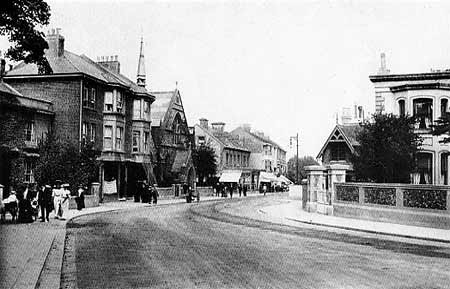|
This article was first published in the West Sussex Gazette on 10th June 1993
Last week Mr Cyril Tickner (87), recalled concert parties in various Montague Street venues earlier this century, and continues this week with memories of his schooldays and his early working life.
Cherishing childhood memories of his schooldays, Cyril recounts, 'On our way home to Broadwater from Sussex Road school in Little High Street we used to hang over the east side of the old Broadwater bridge to watch cattle being unloaded from trains and into the yards, before being driven off to Broadwater, to the slaughterhouse there. If snow was about we would drop some down the chimney of the goods yard office which was built into the bridge, while on the west side was a miller's flour store in the charge of my cousin Harry Millham, whose mother, like mine, was an Olliver descended from the famed miller at Highdown.'
Long before 1917 a photograph of her father with masses of white silvery hair was on show at Worthing railway station, depicted as a Grand Old Man in an advert for Walter Gardiner Photography.
When about 12, Cyril was a part-time errand boy for Lucas the draper in Chapel Road opposite a Methodist church that stood at the junction with Wenban Road. (The church has since been demolished, the site is now occupied by a bedding shop). A soup kitchen operated out of the church, and Cyril was often sent over the road by the Lucas's to bring back soup for them.
'Near the church was a shoe shop also owned by the Lucas's and managed by a Mrs Fielder,' said Cyril. 'Next in that same row of little shops was a bakers run by another member of the Lucas family, whilst at another we youngsters bought crisply fried scorched peas. And there was Geales the greengrocer next to the Labour Exchange on the corner of Lennox Road.'
Further along in North Street was a shop where he would buy black locust beans: 'about three inches long, the rotten ones always seemed to taste best!'
Cyril left school three days before his 14th birthday in 1919 and became a carpenter's boy for Harry Hills in Clifton Road, a builder and undertaker, who was a verger in Holy Trinity church, and he stayed working for him for three years. His first real job there, after sweeping out the shop, was to assist with constructing a coffin in a small workshop at the southern end of Clifton Road, at a time when the small, terraced cottages either side of the Jolly Brewers pub were still there.
'In one of the cottages lived a plasterer named Joyce,' said Cyril, 'and he vividly imitated a cuckoo's call from in his front garden tree!
'Next but one lived a family with one daughter, Annie Hallam, and she was the first girl I took to a social at Christchurch Road Baptist church hall, after asking her father's permission.
'I remember vividly a barber shop complete with coloured pole in Clifton Road run by Percy Mills.
'Near the Clifton Arms was a shopkeeper named Hitchcock, and opposite there, where Warner's second-hand shop is now, was Brakes the plumber.
'Harry Hills, my employer, had a shop in Clifton Road and his daughter Doris worked in the front shop with a young fellow named Streeter. I worked with Hills' son Roland in the Howard Street carpenters' shop and with a carpenter named Harry Bridger, who was my mother's cousin and lived opposite the Jolly Brewer.
'From the undertakers shop I was instructed one day to take a white-covered box to the cemetery tool store which stood at the north end of what was then a new part of the cemetery --- the eastern extension of South Farm Road cemetery --- which had few graves in it. I wondered why several women stared, until I was informed that the box held a still-born baby.'
It was in 1926 that Cyril met and courted a pretty young 21 year-old, Grace March, who was to become his wife. She worked as a parlour maid at a large double-fronted villa in Farncombe Road, where Griffin Factors have since erected a modern administrative block.
Happy and humorous memories flow back to Cyril, 'I used to wait outside for Grace in Farncombe Road and one day a neighbour reported me loitering with intent and a policeman arrived to investigate!'

Looking north up Chapel Road in 1906, from where the North Street roundabout is today, towards the Methodist church (left of centre) that stood at the corner of Wenban Road until 1958. The site is currently occupied by a bedding shop.
|
This article was first published in the West Sussex Gazette on 10th June 1993
The following week Grace told an interesting story of shoemakers and cobblers, and included memoirs of bygone Broadwater too.
| |


